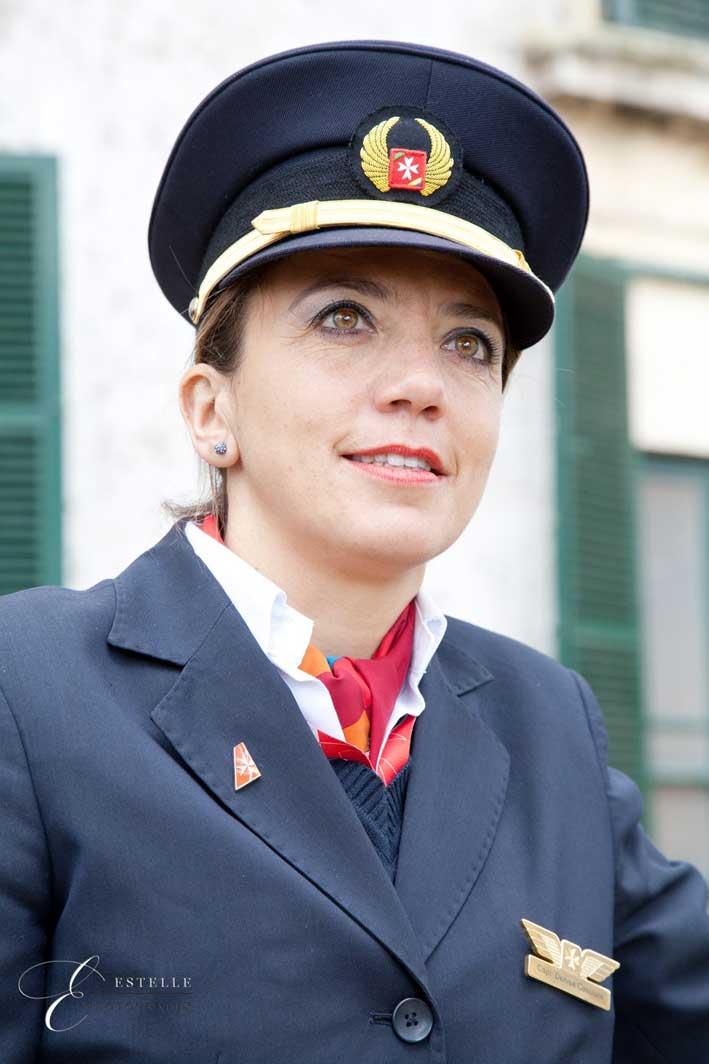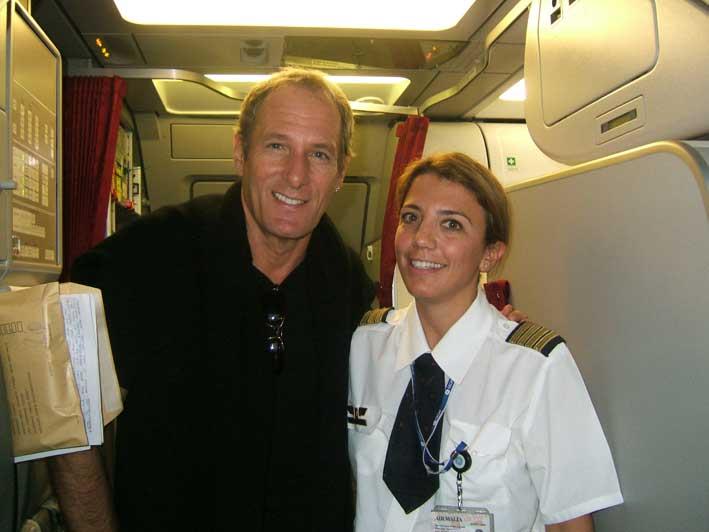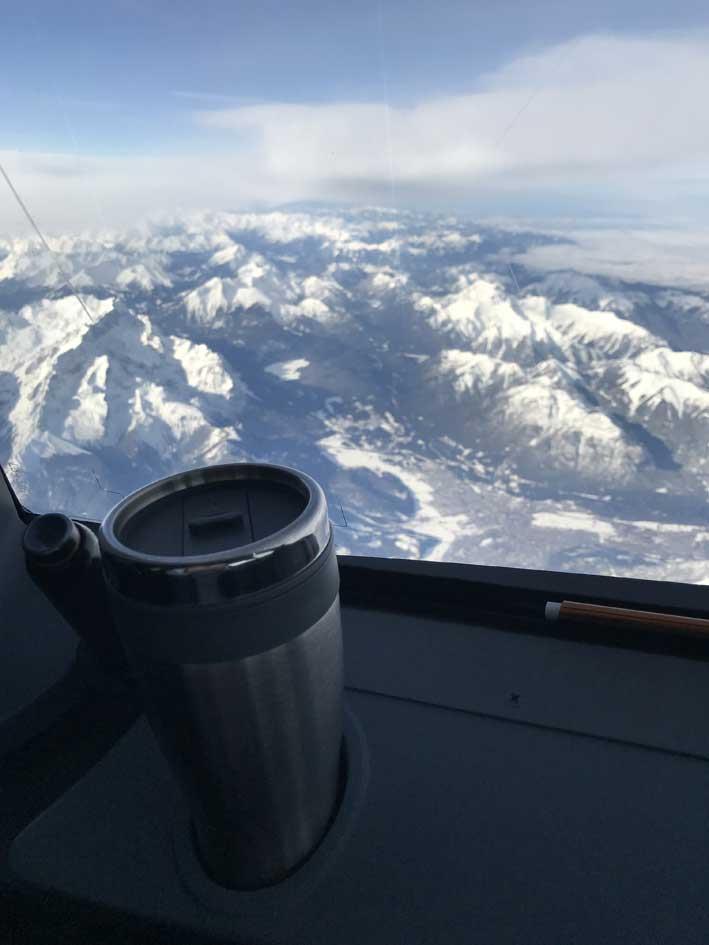Although female pilots only account for around 4.5 per cent of commercial pilots in Europe, women have been working in aviation industries around the world since the earliest days of air travel. Traditionally, however, female roles in aviation were limited to non-flying jobs such as air hostesses, flight simulation training and air traffic control. While the number of women working as pilots has risen immensely, it remains far too low, particularly given the fact that it is one of the few industries in the world with genuine pay equality. The world of aviation is set with rigorous training and tough competition. It takes years of determination and dedication to become a commercial pilot and the learning doesn't stop there - with continuous ongoing assessments.
Denise Casolani is a captain with Air Malta and just one of an estimated 450 female captains worldwide. She has been a pilot for over 24 years and trained in Germany as well as the United States. During the last 12 years, Denise has been in command (a captain) and during this time, she has flown across continents, from Europe, Africa, South America, North America and the Middle East.
We caught up with Denise to find out more about her fascinating career.
Denise, what inspired you to become a pilot and when?
My interest in becoming a pilot started as a young child. As a student, I pursued my academic studies at University in Maths and Physics. Not long after Air Malta provided me with the opportunity to join the fleet in 1994 as a cadet pilot.

How did you become a commercial pilot?
After achieving the initial licence, the PPL (Private Pilots Licence) and the first solo flight, I proceeded onto more studying for the CPL (Commercial Pilots Licence) and the ATPL (Airline Transport Pilots licence) to finally be able to fly passengers commercially. At present, I am flying an Airbus 319/320. My earlier years were spent in the series of Boeing planes as well as the RJ70.
Can you describe a typical shift for you? Do you spend many nights away or is that a myth?
There is definitely no typical day in this industry: different planes, different crew, different destinations and passengers with various needs, not to mention ever-changing weather and Air Traffic Control restrictions! All these components make it a very dynamic and interesting day at work. Dealing with and resolving situations and challenges is the name of the game.
If I had to describe a typical day, it would start with the pilots briefing the flight, discussing mainly the routings, any restrictions such as Air Traffic Control and destination airport, fuel required and protocols followed. From there we would then in turn brief the cabin staff regarding any weather conditions or restrictions that might limit in-flight service. We would then proceed together to the aeroplane and start our respective tasks before we are ready to receive the passengers. This is basically checking the plane, both externally and internally, as well as setting up the cockpit.
We fly at night as much as we fly during the day - the planes never stop. But, luckily, I always go back to my family after a day's - or night's - work. So I guess it's a myth that we spend many nights away.

What are the best parts and the downsides to being a pilot?
The best parts for sure are that my 'office' has the most incredible view and the landscape is constantly changing. I work with different colleagues and visit many different countries. It is truly a pleasure going to work as I love flying. I would have to say the downside of being a captain is working mostly when everyone else tends to go on holiday, namely weekends, Christmas and holiday periods.
Working nights and odd hours goes against the circadian body clock, so it's not ideal. A pilot has to keep on studying and tested throughout the career, unlike most other professions that I know of.
Is it a career you would recommend others to follow?
Yes, definitely - if flying is your dream! Otherwise, I would not advise it. There are a lot of sacrifices that the pilot and his/her family have to adapt to, such as missing out on special family events, for example.
Tell us about any trips you would love to make and do you have any favourite routes?
I'd love to visit Israel in the near future, apart from many other fascinating, exotic countries. My family and I really love the great outdoors and different cultures. We've covered Europe pretty well and it's always a pleasure to venture further. With regard to my favourite route whilst working, at the moment we only fly in Europe and North Africa. Crossing the Alps is always so picturesque and pleasing, and when flying the London route there's a certain familiarity to it, as it is very popular with us Maltese and the chances of having family and friends on board are high. Travelling is obviously my favourite hobby!
What challenges do you face as a woman in a male-dominated industry and do you actually see it as male-dominated?
I've been here for over 22 years now, and I'm used to the male-dominated aspect which doesn't bother me in the least. Whether it is training, procedure or rostering, there is absolutely no distinction between male and female pilots. We're completely equal and I believe that our male colleagues are comfortable with us too. Flying these modern jets is no longer a physical ability that requires strength. We do, however, get mixed reactions from the passengers. There's still the element of surprise when they see a female flying the plane and the comments range from cheering us and giving us the thumbs-up to "oh, no - it's a female pilot!" You get used to these comments and you take them in your stride, jokingly.

How do you manage the work-life balance?
Well, now that my children are older and more independent, life is easier. Being a working mum, like any other working mum for that matter, there's a lot of juggling and planning and making sure to be present when it's truly important and necessary. Everyone at home helps with housework so that eventually all the family can enjoy quality time together.
What's the strangest thing that has ever happened on board?
A lot of passengers are very intrigued with flying and often ask to visit the flight deck or to join us for take-offs and landings. For security reasons, this is not allowed any more - although it was in the past. One particular passenger I remember very clearly, was Cherie Blaire, the wife of the then British Prime Minister. She also wanted to stay on the flight deck for landing in Malta, but we had to point out that it was her husband who made the law regarding no passengers in the flight deck, especially in UK airspace!
On another occasion, I had Michael Bolton on my flight as he was flying to Malta to perform with Joseph Calleja. I was rather thrilled to meet him and, in conversation, he asked me what I'd be doing on the coming Saturday (obviously intending to offer me tickets for the concert.) I quickly checked my roster and realised I would be working - and that's exactly what I told him, rather than saying: "I'll certainly be off for your concert!" I wish I knew how to lie!

Photos: Estelle Photography